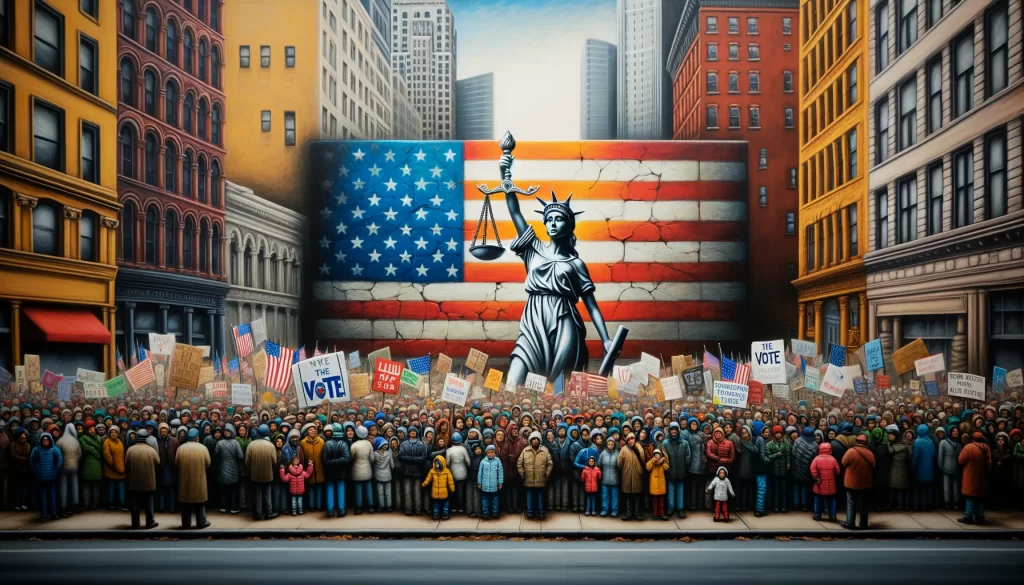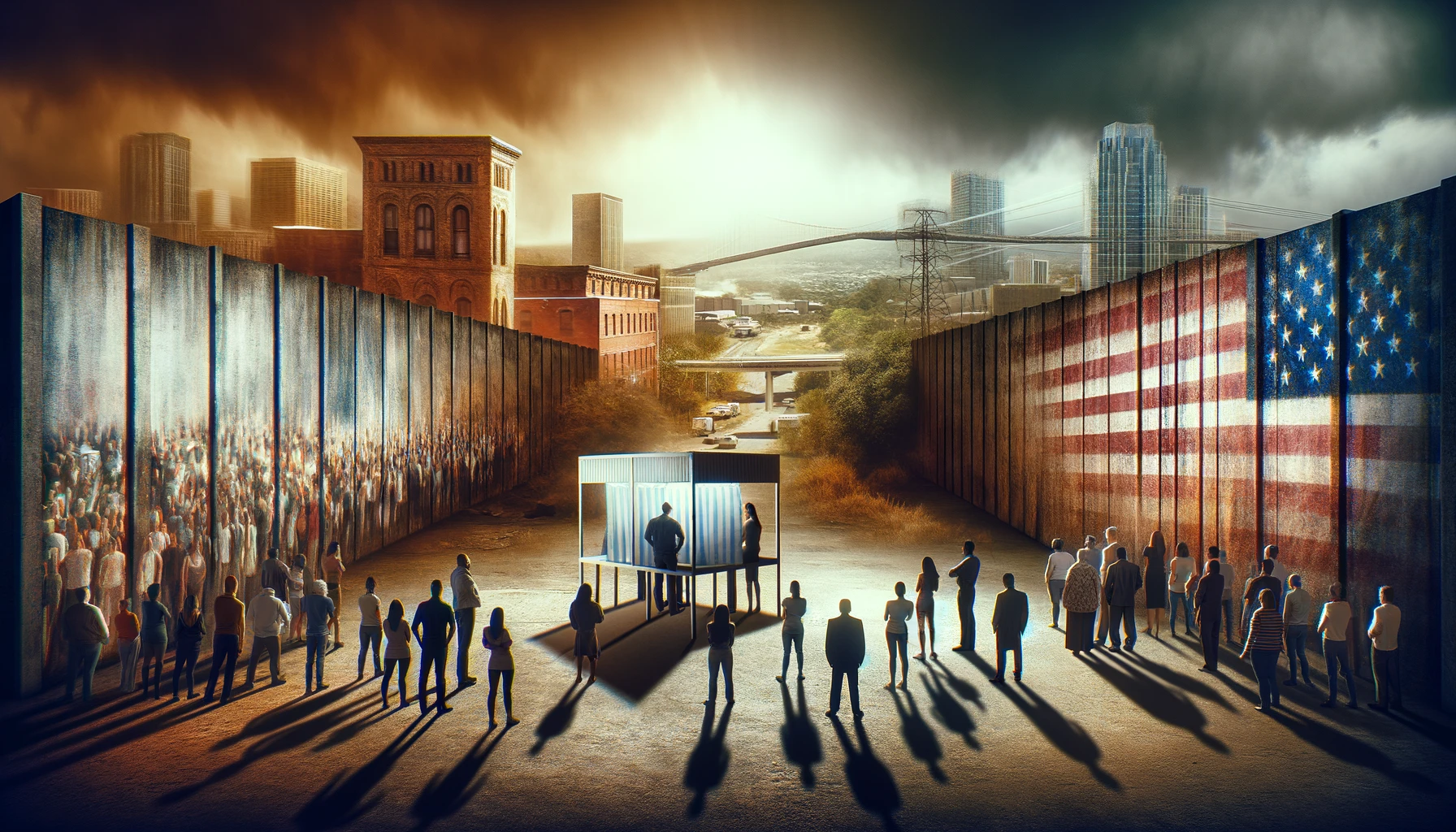In the lead-up to the 2024 U.S. elections, a major concern is emerging about immigration and voting. There’s a false belief that undocumented immigrants significantly impact federal elections, a myth with over a century of history. This year, the myth gains traction due to the increased number of migrants at the U.S.-Mexico border, with notable figures like Cleta Mitchell, a former advisor to Donald Trump, and Trump himself, emphasizing this narrative.
According to a report by NPR (https://www.npr.org/2024/03/13/1238102501/noncitizen-voting-immigration-conspiracy-theory), Mitchell has been distributing a memo that argues the 2024 elections face a threat from noncitizen voting. She claims, without evidence, that the Biden administration’s immigration policies are a deliberate effort to increase illegal voting by noncitizens. This claim is also supported by Donald Trump and Elon Musk, who suggested in one of his posts on X that Democrats are “importing voters.”
However, it’s crucial to note that voting by noncitizens in federal elections is illegal, and extensive research shows that it rarely occurs. Despite this, the myth persists, fueling doubts about election integrity among many, particularly Republicans who see immigration as a major issue.
A Look into the History of the Myth
The history of noncitizen voting in the U.S. dates back to the late 1800s. Initially, noncitizen voting was common and accepted. Yet, attitudes shifted post-Civil War as European immigration increased, leading to xenophobia and restrictive voter registration systems aimed at disenfranchising immigrants.
Mitchell’s concerns revolve around the National Voter Registration Act of 1993, which simplified voter registration but didn’t require proof of citizenship, only a sworn statement. Critics argue that this isn’t enough, though identification numbers provided during registration serve as an effective citizenship check.
Experts warn that demanding proof of citizenship for voting registration could disenfranchise many eligible voters, including naturalized citizens, without addressing any significant problem. Despite these warnings, the narrative of noncitizen voting fraud persists, unsupported by evidence. Studies, including a comprehensive analysis by the Brennan Center for Justice, have found noncitizen voting to be an exceedingly rare occurrence.

In Georgia, for instance, an audit found fewer than 2,000 suspected noncitizen registrants over 25 years, with none successfully casting a ballot. Georgia’s Secretary of State, Brad Raffensperger, who is a Republican, emphasizes that noncitizens do not vote in significant numbers in the state, even as he pushes for measures to prevent noncitizen voting, reflecting broader concerns despite a lack of evidence.
Legislation introduced across various states aims to require proof of citizenship for voter registration, indicating a national trend. While federal law already prohibits noncitizens from voting in federal elections, the debate intensifies as some cities have allowed noncitizens to vote in their local elections.
This article is based on the following article:
https://www.npr.org/2024/03/13/1238102501/noncitizen-voting-immigration-conspiracy-theory

Background Information
Understanding these concepts can help the reader comprehend the discussions around immigration and voting in the U.S., especially in the context of the concerns raised ahead of the 2024 elections. The debate over non-citizen voting touches on issues of election integrity, the rights of immigrants, and the importance of maintaining a democratic system that accurately reflects the will of its citizens.
1. U.S. Election System Basics:
The United States holds federal elections every two years, with presidential elections occurring every four years. Elections determine who will hold various political offices, from the President to Congress members. Only U.S. citizens are legally allowed to vote in federal elections, a rule that’s in place to ensure that the country’s leaders are chosen by its citizens.
2. Immigration:
Immigration refers to the action of coming to live permanently in a foreign country. The U.S. has a long history of immigration, with people from all over the world moving to the country for various reasons, including seeking better opportunities or escaping difficult situations in their home countries.
3. Noncitizen Voting:
Historically, noncitizen voting was not uncommon in the early years of the United States. However, laws and attitudes changed over time, particularly after the Civil War, leading to restrictions that prevented noncitizens from voting. Today, it is illegal for noncitizens to vote in federal elections, though some local jurisdictions may allow noncitizens to vote in local matters.
4. Voter Registration:
Voter registration is the process by which eligible citizens sign up to be able to vote in elections. The National Voter Registration Act of 1993 (also known as the “Motor Voter Act”) made it easier for people to register to vote by allowing them to do so when applying for a driver’s license and through other means. The act aimed to increase voter participation but does not require proof of citizenship beyond an affirmation and, in some cases, an identification number.
5. Voter Fraud:
Voter fraud involves illegal interference in the election process, such as voting multiple times, impersonating another voter, or tampering with ballots. It is a serious crime, but extensive research has shown that voter fraud is extremely rare in the United States.
6. Xenophobia:
Xenophobia is a fear or hatred of foreigners, people from different cultures, or strangers. Throughout history, waves of immigration have sometimes led to xenophobic reactions among the native population, which in turn have influenced policies and attitudes toward immigrants, including their right to vote.
7. Election Integrity:
Election integrity refers to the trustworthiness of election processes and results. Ensuring elections are free, fair, and transparent is crucial for maintaining public confidence in democratic institutions. Allegations of voter fraud, even when unfounded, can undermine this trust.

Suggested Debate/Essay Questions
- Should Noncitizens Be Allowed to Vote in Local Elections?
- Do Laws Requiring Proof of Citizenship for Voter Registration Protect or Undermine Election Integrity?
- Can Voter Registration Policies Be Designed to Both Prevent Noncitizen Voting and Ensure Full Participation by Eligible Voters?
Please subscribe to Insight Fortnight, our biweekly newsletter!
